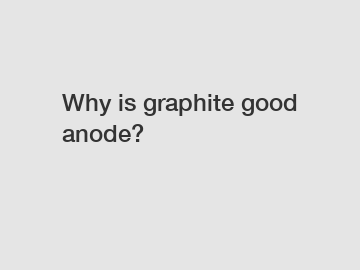Why is graphite good anode?
Lianjing supply professional and honest service.
Why is Graphite a Good Anode?
Graphite is a remarkable material that has found countless applications in various industries. One such application is its use as an anode in different electronic devices, including batteries and fuel cells. In this article, we will explore the reasons behind graphite's popularity as an anode material and delve into its unique properties that make it an excellent choice.

Graphite, a form of carbon, is composed of layers of tightly bonded carbon atoms arranged in a hexagonal lattice. This unique molecular structure gives graphite its exceptional properties, including high electrical conductivity, chemical stability, and lightweight nature. These attributes play a significant role in making graphite a preferred material for anodes.
When it comes to batteries, the anode is responsible for storing and releasing electrical energy. Graphite anodes are widely used in lithium-ion batteries, which power a vast range of electronic devices, from smartphones to electric vehicles. One of the primary reasons for this preference is graphite's ability to efficiently accommodate lithium ions during the battery's charging and discharging cycles.
Graphite has a layered structure that allows lithium ions to easily intercalate, or insert themselves, between its carbon layers. During charging, lithium ions travel from the cathode to the anode, where they intercalate into the graphite layers. This process allows the anode to store electrical energy. Conversely, during discharging, the lithium ions migrate back to the cathode, providing the needed current to power the device.
The intercalation of lithium ions into graphite anodes is not only efficient but also reversible. This reversibility is crucial for the longevity and reliability of the battery. Graphite anodes can withstand numerous charge and discharge cycles without substantial degradation, making them a reliable choice for long-lasting batteries. The ability to tolerate repeated cycles is of utmost importance, especially in applications like electric vehicles, where batteries must endure frequent charging and discharging.
Another advantage of graphite anodes is their stability in the presence of reactive electrolytes. Electrolytes are an essential component of batteries as they facilitate the movement of ions between the cathode and anode. However, certain electrolytes can be chemically reactive and cause unwanted side reactions that degrade the anode material. Graphite's chemical stability protects it from these reactions, ensuring that it remains intact, even in the presence of aggressive electrolytes.
Furthermore, graphite anodes exhibit a high electrical conductivity, which enables efficient electron transfer during the charging and discharging processes. The interconnected carbon layers in graphite facilitate the flow of electrons, reducing resistance and allowing for faster charge and discharge rates. This high conductivity enhances the overall battery performance by minimizing the energy loss that occurs during the transfer of electrical charge.
Apart from its electrical properties, graphite is also lightweight, which is desirable in applications where weight plays a role, such as portable electronic devices or electric vehicles. Its lightweight nature contributes to the overall energy efficiency of the system, allowing for extended operating times and improved energy storage capabilities.
To summarize, graphite is an exceptional choice for anode material due to its high electrical conductivity, chemical stability, reversibility, and lightweight nature. These qualities make it ideal for use in lithium-ion batteries and various other electronic devices. The intercalation of lithium ions between its carbon layers allows for efficient energy storage, while its stability and electrical conductivity ensure reliable and high-performing batteries.
As technology continues to demand more efficient and durable energy storage solutions, graphite anodes are likely to maintain their dominance in the battery industry. Advancements in the field of materials science may further enhance graphite's properties or give rise to alternative materials, but for now, graphite remains a tried and tested choice for powering our modern world.
Please visit our website for more information on this topic.
Want more information on carbon graphite block? Feel free to contact us.



